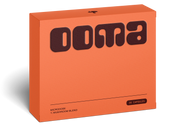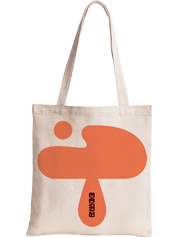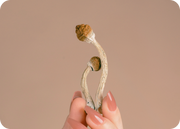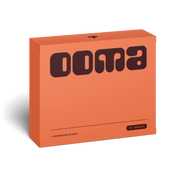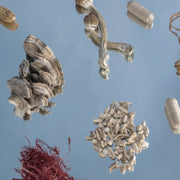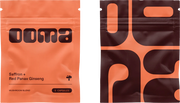Microdosing 101
- Guidance
- 7 min read

Microdosing is taking a small dose, typically one-tenth of a recreational or “heroic” dose. This amount is so subtle that you will likely not experience any of the effects associated with larger doses.
This small but significant microdose can alter your way of thinking, being and behaving to enhance your ever-evolving world.
Instead of a one-time intense experience, the microdose offers a slow, subtle and steady practice over a long period of time. When you take a small dose, you might notice a slight elevation in mood, increased focus and enhanced creativity. Many users report that it promotes everyday ease and enjoyment while enhancing focus on their day-to-day routines and rituals.
how microdosing works
A microdose is a “sub-perceptual” or sub-hallucinogenic dose. This means it’s enough of the mushroom to create positive psychedel-ish effects without a “trip” or out of body experience.
Each person’s tolerance, temperament, and intention will determine the ideal amount for a true microdose, often around one-tenth of a recreational dose. For that reason, we recommend starting low and slow with 150mg, a true microdose, the amount we use in our OOMA blend.
A microdose is an invitation to add depth and elevation to your day. This allows you to continue your daily life without sensory changes that might keep you from your morning meeting. An ideal microdose should blend into your day without being too noticeable. Frequent microdosers report that their everyday dose makes colors appear brighter, problems feel easier to solve, and the day holds a special and unique quality.
When a microdose is taken consistently in what is referred to as a protocol, you can expect to feel significant improvement in emotional balance, inspiration and feelings of self-worth.
In the right “set and setting”, we can achieve long-term benefits for our mental and physical health.
The Effects of Microdosing
With numerous studies reporting positive findings, thought leaders and media coverage have added to a surge of interest in psychedelic therapies for mental health issues like anxiety and depression, and as tools for personal growth.
Research in the 1960s focused on macro-doses, the concept of microdosing gained popularity more recently. The term “microdose” is credited to Dr. James Fadiman, a psychologist and researcher who wrote “The Psychedelic Explorer’s Guide: Safe, Therapeutic, and Sacred Journeys” in 2011.
The renaissance of research on the psychedel-ish mushroom experience focuses on macro-doses and their effects on specific ailments like addiction, depression, anxiety, and PTSD. The effect of microdoses requires further study..
While more research needs to and will be done on the microdose regimen, anecdotal evidence and young research studies suggest several potential benefits of microdosing:
-
Enhanced Creativity
Microdosing has been linked to improved creative thinking. A study published in the journal Psychopharmacology found that microdosing psilocybin can enhance both divergent and convergent thinking, which are critical components of creativity. Participants showed improved problem-solving abilities and increased creative thinking after microdosing (Mush Magic). This aligns with anecdotal reports from individuals who use microdoses of magic mushrooms to boost creativity and innovation.
-
Improved Mood
Many people report mood enhancement as a benefit of microdosing. A survey study published in the Journal of Psychoactive Drugs found that participants who microdosed psilocybin experienced significant improvements in mood and emotional well-being (Mush Magic). These findings are supported by other research indicating that psilocybin can have antidepressant effects, helping to alleviate symptoms of depression and anxiety
-
Increased Focus and Productivity
Microdosing has been reported to increase focus and productivity, making it popular among professionals seeking to enhance their work performance. A study by the Dutch Psychedelic Society demonstrated that participants experienced improved concentration and cognitive flexibility after microdosing (Harvard Science in the News) (Mush Magic). These cognitive enhancements can translate to better performance in various tasks, from everyday work to complex problem-solving.
-
Emotional Balance
One of the profound effects of microdosing is its potential to foster emotional balance. Research suggests that microdosing can help regulate emotions by enhancing connectivity in brain regions associated with emotional processing. For example, a study noted in the Journal of Psychopharmacology showed that microdosing can lead to increased emotional empathy and satisfaction with life (Mush Magic). This emotional stability can be particularly beneficial for individuals struggling with anxiety or emotional dysregulation.
Psilocybin is considered a breakthrough therapy because it can potentially help the brain break out of rigid and restrictive pathways, rewiring patterns in a way traditional therapies cannot. It reduces connections within the usual networks while increasing links between less connected regions. In other words, mushrooms help our minds get creative.When we take a subtle dose of this blissful substance, we are experiencing a quieter version of this eye, mind and heart-opening experience.
Microdosing is for the fungi-curious
Suggested Protocol and Dosage
How often should you microdose to maximize its benefits? The key is consistency and finding a routine that works for you.
First to consider is your intention with microdosing. Are you looking for a slight elevation in your day-to-day experience? Are you considering the therapeutic benefits? Are you looking for a one-off joyful experience?
Intention and consistency is key. No matter what specific regimen you decide to explore, off days allow you to maximize the microdose benefits.
Every Other Day
A common approach is to take a microdose every other day. The positive effects of a microdose often last into the following day. The off day is a perfect opportunity for respite and integration while preventing tolerance from building up. At OOMA, we suggest this every other day approach to maximize the long-term benefits of your microdose.
Want to Switch It Up?
Your inner wisdom and the mushrooms are your muse. There are many suggested protocols with mushrooms. You can try 2 days on, 1 day off or 3 days on, 2 days off. You can experiment with 5 days on, 2 days off or one week off per month.
Microdosing is an experience of self-knowing. You are your greatest guide to your best protocol. Switch it up when you feel called. Experiment, monitor, edit, enjoy.
Consistency is Key
Like any activity that leaves the mind inspired, consistency is a necessary component for your growth era. One yoga class can do wonders. One weekend long-retreat can be an unbelievable time. One great workout, one nutritious meal, one volunteer shift–all wonderful. But after a few weeks, the warm and fuzzy transformation you were seeing begins to wear off. When you truly make up your mind to transform, consistency, practice and depth are imperative.

Enhancing the Outcomes of Microdosing
Microdosing is a wellness regimen. It goes hand-in-hand with all of the other intentional habits you are cultivating. There are a few key ways to maximize the positive benefits of microdosing.
Set an Intention, Grow Forth
Consciously choose a specific goal, purpose or desired outcome. By directing your focus and energy towards what you want to achieve and experience, you can help to direct the mushrooms to where you want to go. By setting a clear intention for your experiences, you can help to guide your own actions and thoughts and align them with your core values and desires.
You might set an intention to heal past hurts, grow in new endeavors or personal practices, enhance motivation, and/or increase mindfulness, kindness, patience or empathy.
Spend some time reflecting on what you truly want. Do your best to get specific, write it down and visualize it happening.

Spend Time in Nature
Nature can enhance the positive effects of microdosing and provide a calm and inspiring environment. Get into your own garden or backyard, visit a favorite park or local farm, surround yourself with organic cut flowers or explore hiking and camping.

Journal, monitor and track your experience
Keep a record of your doses, experiences and any changes you notice. This can help you understand the effects better and direct you to adjust your routine when needed.
Journaling is cathartic, clarifying and expressive. Allow your truth to flow through you. What comes through may surprise you.

Pair it with other healthy life-transforming habits
Activities like yoga, meditation and a balanced diet can complement microdosing and amplify its benefits for overall well-being. Find what you need to be well and run towards it. The microdoses will help to catalyze your efforts.

Ready to start your microdosing journey?
Welcome to OOMA. Accept the invitation inward. Cultivate a future of wellbeing. And look forward to yourself.
- Patrick, Rhonda P., Johnson, Teresa L. (2021). Sauna use as a lifestyle practice to extend healthspan. Experimental Gerontology, 154. https://doi.org/10.1016/j.exger.2021.111509
- Janssen, C. W., Lowry, C. A., Mehl, M. R., Allen, J. J., Kelly, K. L., Gartner, D. E., Medrano, A., Begay, T. K., Rentscher, K., White, J. J., Fridman, A., Roberts, L. J., Robbins, M. L., Hanusch, K. U., Cole, S. P., & Raison, C. L. (2016). Whole-Body Hyperthermia for the Treatment of Major Depressive Disorder: A Randomized Clinical Trial. JAMA psychiatry, 73(8), 789–795. https://doi.org/10.1001/jamapsychiatry.2016.1031
- Henderson KN, Killen LG, O’Neal EK, Waldman HS. (2021). The Cardiometabolic Health Benefits of Sauna Exposure in Individuals with High-Stress Occupations. A Mechanistic Review. International Journal of Environmental Research and Public Health, 18(3), 1105. https://doi.org/10.3390/ijerph18031105
- Ketelhut, S., Ketelhut, R.G. (2019). The blood pressure and heart rate during sauna bath correspond to cardiac responses during submaximal dynamic exercise. Complementary Therapies in Medicine, 44, 218. https://doi.org/10.1016/j.ctim.2019.05.002
